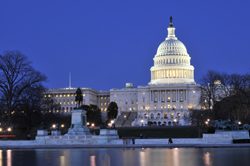Insights...News about faculty and their research

Men tend to be more narcissistic than women, study shows
With three decades of data from more than 475,000 participants, a new study from the School of Management reveals that men, on average, are more narcissistic than women.
Published in the journal Psychological Bulletin, the study compiled 31 years of research and found men consistently scored higher in narcissism across multiple generations and regardless of age.
"Narcissism is associated with various interpersonal dysfunctions, including an inability to maintain healthy long-term relationships, unethical behavior and aggression," says lead author Emily Grijalva, assistant professor of organization and human resources. "At the same time, narcissism is shown to boost self-esteem, emotional stability and the tendency to emerge as a leader."
The researchers examined more than 355 journal articles, dissertations, manuscripts and technical manuals, and studied gender differences in the three aspects of narcissism: leadership/authority, grandiose/exhibitionism and entitlement.

Grijalva
They found the widest gap in entitlement, suggesting men are more likely than women to exploit others and feel entitled to privileges.
The second largest difference was in leadership/authority. "Compared with women, men exhibit more assertiveness and desire for power," Grijalva says. "But there was no difference in the exhibitionism aspect, meaning both genders are equally likely to display vanity or self-absorption."
In addition, the study looked at data from college students between 1990 and 2013, and found no evidence that either gender has become more narcissistic over time.
Research has shown that personality differences, like narcissism, can arise from gender stereotypes and expectations that have been ingrained over time. The authors speculate that the persistent lack of women in senior leadership roles may partially stem from the disparity between stereotypes of femininity and leadership.
"Individuals tend to observe and learn gender roles from a young age, and may face backlash for deviating from society's expectations," Grijalva says. "In particular, women often receive harsh criticism for being aggressive or authoritative, which creates pressure for women, more so than for men, to suppress displays of narcissistic behavior."

In consumers we trust: Customer reviews boost online shopping
Shopping websites with robust, interactive product review systems make customers more satisfied and improve product marketing, according to a new School of Management study.
Published in Information & Management, the study found that e-commerce websites that provide buyers with advanced product review features like images and videos improve customer satisfaction and their perceptions about the site's quality.
"Shoppers trust other shoppers," says study co-author Lawrence Sanders, professor of management science and systems. "When companies give their customers a voice, it's a plus for both sides."

Sanders
According to the study, 80 percent of potential online consumers who plan to purchase a product turn to online consumer reviews before they make a decision.
"Consumer review systems allow customers to make informed decisions," says Sanders. "Retailers should create sites that give customers the tools to create reviews in a variety of ways and allow for quick, accurate responses to customer requests."
The researchers surveyed 313 consumers in Seoul, South Korea, to understand their thought processes and behaviors on e-commerce websites. They chose South Korea because the environment is a good representation of general online consumer behavior, and because their online marketplaces have well-built review systems featuring advanced functionality.
Further research should focus on the effect of review systems on different types of goods and on individual characteristics, purchasing motives and transaction experiences, Sanders says.
Sanders collaborated on the project with Yong Jin Kim, professor of management information systems, Sogang University Business School, and Chul Woo Yoo, assistant professor of information technology and operations management, Florida Atlantic University College of Business.

Public startups boom under JOBS Act, study shows
The JOBS Act is doing its job and getting more startups to go public, according to new research from the School of Management.
Published in the Journal of Financial Economics, the study found the Jumpstart Our Business Startups (JOBS) Act increased initial public offerings (IPOs) by 21 per year since it was passed in April 2012—a 25 percent increase over 2001-2011 levels. Three-quarters of new offerings came from the biotechnology/pharmaceutical industry.
Study co-author Michael Dambra, assistant professor of accounting and law, says businesses that are heavily invested in product research and development—like those in the biotechnology/pharmaceutical industry—have the most to gain from the JOBS Act.
"Because the JOBS Act allows firms to communicate with prospective investors before disclosing required firm-specific information publicly, companies can defer releasing costly research information to competitors," says Dambra. "Without the JOBS Act, a pharmaceutical company would have to immediately reveal details about drugs they're working on when going public, allowing rivals to counter with generic options."

Dambra
An IPO is the first sale of stock by a private company to the public. The JOBS Act streamlines the process for emerging growth companies—those with less than $1 billion in annual revenue—by exempting them from certain accounting and disclosure requirements and allowing them to communicate with prospective investors prior to publicly filing their registration statement.
The study analyzed three samples of data to determine how the JOBS Act has affected IPO activity: a hand-collected sample of U.S. IPOs in the two years before and after the JOBS Act, as well as a domestic and an international sample of IPOs from January 2001 to March 2014.
Dambra cautions, however, that the recent bull market may have also had an impact on the boom in IPOs and suggests that additional research is warranted.
"While we control for market conditions in our tests, we cannot be certain that our results would hold in a bear market," says Dambra.
Dambra collaborated on the project with Laura Casares Field, associate professor of finance and Moore Faculty Fellow in Finance, and Matthew T. Gustafson, assistant professor of finance, both from the Penn State Smeal College of Business.
Everest receives teaching award
In February, Nicholas J. Everest, clinical assistant professor of organization and human resources, received the Arjang A. Assad Excellence in Teaching Award.

Everest
Established with a personal endowment from Assad while he was dean of the School of Management, the award recognizes the contributions of outstanding faculty members. It is presented biennially to a School of Management faculty member who has demonstrated excellence in teaching, leadership and a passion for the profession.
Recipients of the award are chosen based on the recommendations of the school's teaching effectiveness committee. Everest has taught more than half a dozen courses at the undergraduate and graduate levels. He also has played an integral role in the development and implementation of LeaderCORE, the School of Management's award-winning leadership certification program.
"With his extensive multinational industry experience and his years of professional consulting, Nick brings real-world leadership development and a remarkable passion for teaching into all his classes," said Assad. "It is an honor to present him with this well-deserved award."

Social media can help alert students during campus emergencies
Using social media to spread information during campus emergencies can help keep students safer, according to new School of Management research.
Published in the International Journal of Business Information Systems, the study found the widespread popularity of social media and associated mobile apps enables campus authorities to instantly reach a large percentage of students to provide timely and accurate information during crisis situations.
"Research suggests that students are more likely to comply with emergency notifications received through social networks," says lead author Wencui Han, PhD '15, who joined the University of Illinois at Urbana-Champign as an assistant professor this fall. "Social media also allows two-way communication. Campus officials can respond to concerns and provide detailed instructions, and users can add and share content, helping information spread rapidly."

Sharman
The most popular social media sites are free to use, making it cost effective for universities to build and monitor pages across multiple channels.
"Interacting with students on social media imposes a cost in terms of devoting critical manpower, but if universities develop strategies for managing social platforms for different types of incidents, they can better prepare students during emergencies," says co-author Raj Sharman, associate professor of management science and systems.
The researchers surveyed campus safety managers from 183 universities that do not have social networking accounts for emergency situations such as criminal incidents, natural disasters or health-related crises. They found campuses with higher incident rates used more traditional channels—including television, radio, alarms and email and text message alerts—and were more likely to consider adopting social media for emergency notifications.
Social media does have limitations, as students may post misleading information or not subscribe to certain channels. As such, researchers recommend universities continue to deploy traditional methods as their primary notification system and use social media to provide supplemental information.
The research team also included Serkan Ada, associate professor of international trade and business, Selšuk University, Turkey, and Anand Simha, both of whom earned their PhD from the School of Management, as well as Robin Hattersley Gray, executive editor, Campus Safety magazine.
